
Language Matters: Interviews With 22 Quebec Poets
Edited by Endre Farkas, Carolyn Marie Souaid
Non-Fiction
PurchaseAbout the book
“May you live in interesting times.” So goes the ancient Chinese curse. In Quebec, we are always living in “interesting” times. Where else in Canada, perhaps even the world, do you have official language police that patrol the highways and byways of the province looking for missing accents, illegal apostrophes and on/off switches in the wrong language? Where else in Canada do you have to make sure that sign size matters? Is it 30% bigger or smaller than the other? Where else in Canada do you pause to consider how to say hello to someone before you actually do?
Launched in 2009 on St. Jean Baptiste Day, Poetry Quebec was an online magazine dedicated to showcasing the English-language poets and poetry of “la belle province.” Its founding editors and publishers — poets themselves — came from very different backgrounds but shared the desire to make sure the English-language poetry of Quebec got the attention it deserved.
In this book, some of the best and most innovative English-language poets of Canada — rising stars and award-winning authors — reflect on these and other questions of politics and poetics. Culled from the website and expanded for this publication, those interviewed include Erín Moure and Stephanie Bolster (winners, Governor General’s Award); GG nominee David McGimpsey; Trillium Prize nominee Mary di Michele; Susan Gillis and Gabe Foreman (winners, A.M. Klein Poetry Prize), Carolyn Marie Souaid and Endre Farkas (winners, Zebra International Poetry Film Festival, Berlin); performance poets Catherine Kidd, Moe Clark and kaie kellough; and Rhodes scholar Mark Abley—all contemplating the work they do against the backdrop of this interesting place and time.
About the authors

Mark Abley has written three books of poetry: Blue Sand, Blue Moon (Cormorant, 1988), Glasburyon (Quarry, 1994) and The Silver Palace Restaurant (McGill-Queen’s, 2005). “Glasburyon,” a poetic elegy for dying languages, has been translated into Esperanto and Jèrriais. At the moment he is preparing a volume of new and selected poems.
He has also written two children’s books and five books of non-fiction. The most recent, Conversations With a Dead Man: The Legacy of Duncan Campbell Scott, was submitted on deadline to Douglas & McIntyre Ltd. in October 2012, the same week that the publisher entered bankruptcy protection. Such episodes of bad luck, even though they hurt, don’t begin to match all the good luck he received in winning a Rhodes Scholarship and a Guggenheim Fellowship, marrying an amazing woman and fathering two tremendous daughters.

Maxianne Berger’s most recent book is Dismantled Secrets (Wolsak and Wynn, 2008). She has been involved with poetry in and around Montreal since 1985. Her debut collection, How We Negotiate, appeared in 1999 with Empyreal Press. A French version was published by Écrits des forges in 2006; translated by Florence Buathier, it is titled Compromis. Her recent poems flow in two directions: in some she explores OuLiPo-style constraints, and in others the minimalism of Japanese forms. Her “Winnows” project serves these approaches simultaneously. Active in both the French and English haiku and tanka communities, she reviews for Tanka Canada’s Gusts, and writes on the poetics of tanka for the Revue du tanka francophone. In 2003, she co-edited (with Angela Leuck) the anthology Sun Through the Blinds: Montreal Haiku Today. In 2012 and 2013, she co-edited two French-language tanka anthologies (with Mike Montreuil of Ottawa) for Éditions des petits nuages.

Stephanie Bolster’s latest book, A Page from the Wonders of Life on Earth, was shortlisted for the Pat Lowther Award, and an excerpt from her new project was chosen as a finalist for the CBC/Canada Writes competition in 2012. Her first book, White Stone: The Alice Poems, won the Governor General’s Award and the Gerald Lampert Award in 1998. Her work has also received the Bronwen Wallace Award, the Archibald Lampman Award, and The Malahat Review’s long poem prize, among other awards, and has been translated into French, Spanish, and German. She edited The Best Canadian Poetry in English 2008 and The Ishtar Gate: Last and Selected Poems by the Ottawa poet Diana Brebner, and co-edited Penned: Zoo Poems. Born in Vancouver, she teaches creative writing at Concordia University and lives in Pointe-Claire, Quebec.

Jason Camlot is the author of three collections of poetry, The Debaucher (Insomniac Press, 2008), Attention All Typewriters (DC Books, 2005), and The Animal Library (DC Books, 2001). A new book of poems entitled What the World Said will appear with Mansfield Press in 2013. His critical works include Style and the Nineteenth-Century British Critic (Ashgate, 2008) and Language Acts: Anglo-Québec Poetry, 1976 to the Twenty-First Century (Véhicule Press, 2007), co-edited with Todd Swift. He teaches Victorian literature at Concordia University in Montreal.

Montreal-based poet, singer-songwriter, editor, and translator Brian Campbell is the author of Guatemala and Other Poems (1994) and Undressing the Night (2007), a translation of the selected poems of Nicaraguan-Canadian poet Francisco Santos.
His poetry, reviews, and essays have appeared in literary magazines such as The Antigonish Review, Vallum, CV2, The New Quarterly, Grain, Prairie Fire, Rock Salt Plum Review, The Rover, and The Saranac Review. A finalist in the 2006 CBC Literary Award for Poetry, he is also the co-founder/editor of Sky of Ink Press, which prints quality chapbooks by emerging poets. His independent music CD, The Courtier’s Manuscript, was released in 2002.

Métis spoken word artist Moe Clark fuses her unique understanding of performance narrative with traditions of circle singing and spoken word. Her debut album is Circle of She: Story & Song. She appeared at the IDEA World Congress: Art for Social Change (Belem, Brazil, 2010), the Maelström ReÉvolution Fiéstival (Brussels, 2009), Aboriginal Music Week (Winnipeg, 2012), the Makusham APTN Series (Moncton, 2011), and the Canadian Festival of Spoken Word (2007, 2008, 2010). A featured speaker at TedXMontreal (2012), she performed for the Canadian Olympic Team at the Olympic Summer Games in London (2012). Her forthcoming album of words and music will appear in 2013. “Intersecting Circles,” which appeared as a videopoem in 2009, is now part of the permanent collection at the Peace River Museum, Archives and Mackenzie Centre.
Clark also works as a community educator to facilitate voice, and conducts writing and spoken word workshops in high schools and local communities to promote literacy and creative expression.
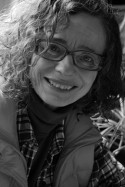
Poet, novelist, and member of the collaborative writing group, Yoko’s Dogs, Mary di Michele is the author of eleven books, including a selected poems, Stranger in You (Oxford University Press, 1995) and the novel, Tenor of Love (Viking Canada/ Simon & Schuster, USA, 2005). She lives in Montreal, where she teaches at Concordia University in the creative writing program. Her most recent books are The Flower of Youth, Pier Paolo Pasolini Poems (ECW Press, 2011) and with Yoko’s Dogs, Whisk (Pedlar Press, 2013). She has won numerous awards, including first prize for poetry in the CBC Literary Competition, the Air Canada Writing Award, and the Malahat Review Long Poem Competition. Her poetry books have also been shortlisted for the Trillium Award, and the A.M. Klein Prize twice.
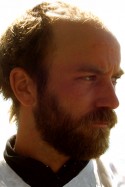
Gabe Foreman was born in Thunder Bay and has worked as a tree planter in British Columbia, Alberta and Ontario. His first book, A Complete Encyclopedia of Different Types of People (Coach House Books, 2011) was awarded the A.M. Klein Prize for Poetry and was a finalist for the Concordia University First Book Prize. A co-founder of littlefishcartpress, his work has appeared in a number of literary journals, including Grain, The Fiddlehead and Event. Currently he lives in Montreal, where he manages the soup kitchen at a long-established mission.
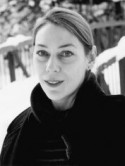
Susan Gillis has lived on the Atlantic and Pacific coasts of Canada, and now lives most of the year in Montreal, where she teaches English. Her poems have appeared in literary journals and anthologies, and her first book, Swimming Among the Ruins (Nuage/Signature 2000), was shortlisted for the 2001 Pat Lowther Award and the 2001 Re-Lit Award. "Kitchen Floor," a limited-edition broadside illustrated by Lori Doody, was published by Delirium Press in 2002. Volta is Susan's second book.
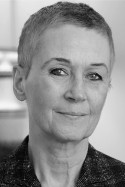
Charlotte Hussey teaches Old Irish and Arthurian Literature at Dawson College in Montreal. She has published Rue Sainte Famille, which was shortlisted for the QSPELL Awards, and a chapbook, The Head Will Continue to Sing. Writing her doctorate on the Modernist poet H.D. reawakened Charlotte’s love of antiquity and led to her latest collection, Glossing the Spoils.
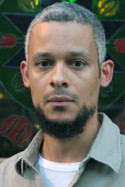
kaie kellough is a Montreal word-sound systemizer. He is the author of two books of poetry: lettricity (Cumulus, 2004), and maple leaf rag (Arbeiter Ring, 2010), which was nominated for the Manuela Dias Design Award. kellough is the voice of two sound recordings, vox:versus (wow, 2011), a suite of conversations between voice and instrument, and esion (howl, 2013). His print and sound work is underwritten by rhythm and by a desire to dis-and re-assemble language and meaning, and his art emerges where voice, language, music, and text intersect. He has performed and published internationally, and is presently working on a novel and on a series of language-based visual works.
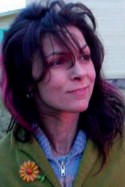
Catherine Kidd is author of the novel Missing the Ark and two poetry collections, Sea Peach and Bipolar bear. Sea Peach is also a critically acclaimed solo show, which toured to venues including the Spier Arts Poetry Festival (Cape Town, South Africa), a Yellowknife storytelling festival, Singapore’s Esplanade on the Bay, and Toronto Harbourfront’s World Stage. A graduate of Concordia University’s M.A. program in Creative Writing, Catherine has taught Fiction at Concordia, as well as workshops through the Quebec Writers’ Federation and Blue Metropolis. Her writing has appeared in P.E.N. International, Matrix magazine, and The Journey Prize Anthology. Her new solo performance, Hyena Subpoena, was launched in fall 2011 in Montreal. She is currently recording the Hyena poems with soundscapes.

Award winning haiku and tanka poet Angela Leuck has been published in journals and anthologies worldwide. Her poems were included in Haiku Journey, a video game by Hot Lava Games (2006). The author of Garden Meditations and a cicada in the cosmos (inkling press, 2010), haiku white and haiku noir (carve, 2007) and Flower Heart (Blue Ginkgo Press, 2006), she also edited numerous anthologies, including Rose Haiku for Flower Lovers and Gardeners (Price-Patterson, 2005), Tulip Haiku (Shoreline, 2004), and, with Maxianne Berger, Sun Through the Blinds: Montreal Haiku Today (Shoreline, 2003). She has read and led numerous workshops at schools, libraries and conferences, and participated in the national Random Acts of Poetry project in 2007 and 2010. She is the founder and organizer of the Black Tea Haiku Group in Montreal and is the Quebec Regional Coordinator for Haiku Canada. In 2005, with Kozue Uzawa, she co-founded Tanka Canada and its biannual journal Gusts.
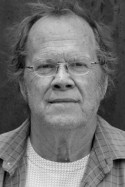
Born in Coventry, England, Steve Luxton has published five collections of poetry, most recently In the Vision of Birds: New and Selected Poems. His work has appeared widely in literary journals such as Canadian Forum, Canadian Literature, Fiddlehead, Sidestreet, and Jacket (Australia), and in Next Teller: A Book of Canadian Storytelling. The former co-owner and editor of DC books, he was one of the original editors of Matrix magazine and The Moosehead Review, and one of the founders of the now defunct Montreal Storytellers, an oral storytelling group which performed in both Canada and the U.S. Before retiring and moving to the Eastern Townships of Quebec, he taught English Literature at John Abbott College and Creative Writing at Concordia University.

David McGimpsey is the Montreal-based author of five collections of poetry, most recently Li’l Bastard, which was shortlisted for the Governor General’s Award and named as one of the “Books of the Year” by both Quill & Quire and The National Post. Some of his other books include the short fiction collection Certifiable and the award-winning critical study Imagining Baseball: America’s Pastime and Popular Culture. A contributing editor for EnRoute magazine, he is the Montreal fiction editor for Joyland magazine and fiction editor for the Punchy Books imprint of DC Books. Named by CBC as one of the “Top Ten English-language Poets in Canada,” his work was the subject of a book of essays Population Me: Essays on David McGimpsey (Palimpsest Press). He holds a Ph.D. in Literature, and teaches creative writing and literature at Concordia University.

Montreal poet Erín Moure writes in English, Galician and French and translates from French, Spanish, Galician and Portuguese into English. Her latest published poetry is The Unmemntioable (Anansi, 2012) and most recent translation, with Robert Majzels, is White Piano by Nicole Brossard (Coach House, 2013). Their translation of Nicole Brossard’s Notebook of Roses and Civilization was a Griffin Prize finalist. Moure has recently completed a full-length play, Kapusta, and in the fall of 2013 her Little Theatres (Anansi, 2005) will appear in French translation by Daniel Canty as Petits Théâtres (Éditions du Noroît).

Robyn Sarah has lived in Montreal since early childhood. Her poetry began appearing in magazines in the early 1970s, while she completed studies at McGill and the Conservatoire de musique du Québec. In 1976, she co-founded Villeneuve Publications, and, until 1987, co-edited its poetry chapbook series, which included first titles by August Kleinzahler, A.F. Moritz, and others. The author of nine poetry books and two short story collections, Sarah has also published a book of essays on poetry. A selection of her poems in French translation appeared in 2007. Her poems have been anthologized in Fifteen Canadian Poets x 2 and x 3, The Bedford Introduction to Literature, The Norton Anthology of Poetry, Good Poems for Hard Times (Garrison Keillor), Best Canadian Poems in English (2009 and 2010), and Modern Canadian Poetry: An Anthology (Carcanet, UK, 2010). She is currently poetry editor for Cormorant Books.

Richard Sommer taught myth and poetry at Montreal's Concordia University for many years, served three decades as a volunteer game warden in the Eastern Townships of Quebec, and led a citizens' environmental group in a seven-year battle, ultimately successful, to save the Townships' Pinnacle Mountain from developers. Sommer's previous books include Homage to Mr. Macmullin, Blue Sky Notebook, left hand mind, Milarepa, The Other Side of Games, Selected and New Poems, Fawn Bones, and The Shadow Sonnets. In 2004, Sommer was diagnosed with prostate cancer, and the verse journal, Cancer Songs, has been an important part of his response to this challenge. He lives on a dirt road outside Frelighsburg with his wife of more than forty years, dance improvisationalist, teacher and artist Victoria Tansey. They have three grown children, three grandchildren, and currently three cats.

Gillian Sze is the author of The Anatomy of Clay (ECW Press, 2011) and Fish Bones (DC Books, 2009), which was shortlisted for the QWF McAuslan First Book Prize in 2009, as well as three chapbooks: This is the Colour I Love You Best (2007), A Tender Invention (2008), and Allow Me to Conjugate (2010). She co-founded Branch Magazine, an online magazine showcasing Canadian art, design and writing, and is currently working on a Ph.D. at Université de Montréal. Her next book, Peeling Rambutan, is forthcoming from Gaspereau Press in 2014.
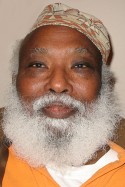
Mahamud Siad Togane is a Somali-Canadian writer and peace activist who has been living in Canada since 1973. In 1986, he published The Bottle and The Bushman: Poems of the Prodigal Son, which focuses on themes of racism, alcoholism and Christianity. His work has also appeared in Bridges: Literature across Cultures (1994), Quebec Suite: Poems for and about Quebec (1995), Eternal Conversations (2003), and Fifty years, Fifty stories (2003). He received an M.A. in creative writing from Concordia University in 1982.
About the editors
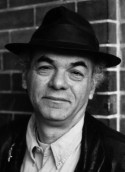
Endre Farkas was born in Hungary and is a child of Holocaust survivors. He and his parents escaped during the 1956 uprising and settled in Montreal. His work has always had a political consciousness and has always pushed the boundaries of poetry. Since the 1970s, he has collaborated with dancers, musicians and actors to move the poem from page to stage. Still at the forefront of the Quebec English language literary scene - writing, editing, publishing and performing - Farkas is the author of eleven books, including Quotidian Fever: New and Selected Poems (1974-2007). He is the two-time regional winner of the CBC Poetry "Face Off" Competition. His play, Haunted House, based on the life and work of the poet A.M. Klein, was produced in Montreal in 2009. Farkas has given readings throughout Canada, USA, Europe and Latin America. His poems have been translated into French and Spanish, Hungarian, Italian, Slovenian and Turkish.
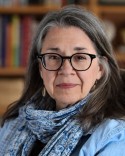
Carolyn Marie Souaid is a Montreal-based writer, editor and painter. She is the author of nine poetry collections and the novel, Yasmeen Haddad Loves Joanasi Maqaittik, winner of the Silver Medal for Best Regional Fiction at the NYC Independent Publisher Book Awards. She has performed at literary festivals and events in Canada, Europe and the U.S., her work garnering a top prize at the Zebra Poetry Film Festival in Berlin and appearing on shortlists for the Pat Lowther Memorial Award and the A.M. Klein Prize for Poetry. Throughout her career, she has worked extensively to build bridges between linguistic and cultural communities in Quebec, including a decades-long involvement with the Inuit. Souaid's work has appeared in print and online journals, nationally and internationally, and has been featured on CBC-Radio. Her literary papers (1967-2022) are housed at Rare Books and Special Collections of the McLennan Library of McGill University.
Excerpt
from Foreword
God knows the creative process is a mystery. To make something out of nothing, to see a world in a blank page, to hear imagined people speak, to touch things that aren’t there, to taste what is not yet baked, to speak volumes or write an image is something to wonder at, something awesome to behold. Yet these are the things that artists do every day. These are the tasks, pleasures and pains that artists, including poets, undertake. Transmitters of acts of the imagination, poets use language to make their unique works of art. But how do they do this?
This is one of the many questions we asked Quebec’s English-language poets over the four-year lifespan of the online literary magazine that we, along with Elias Letelier, founded on June 24, 2009, Quebec’s Fête Nationale. We were curious about their process but we also wondered whether living in Quebec and writing in the language of “les autres” meant anything aesthetically, socially, culturally and politically. We had a poetic and political agenda. Poetry Quebec, or PQ, was a conscious and deliberate nod (and wink) to Quebec’s separatist party, the Parti Québécois. We wanted through our tongue-in-cheek name and motto, “Je me souviens,” to signal that Quebec’s English-language poets are Quebec poets who were, are and will be here to remember and be remembered. The name and motto were also a manifesto of our engagement.
One thing that differentiates human beings from other creatures is consciousness. Through consciousness, humans are aware of their existence. Yes, philosophers, crackpots and artists may question the reality of this existence, but most seem to agree that humans are “aware” of the fact that they are aware. Just how aware is another question. But the degree of awareness is secondary to the fact that humans sit around fires, in caves, cafés, classrooms, and at desks long into the night, contemplating it.
Of course, this contemplation brings to light the big questions: Why and how did we come to be? We attempt to answer these and other questions through religion, science and the arts. Over the centuries, we have looked into the entrails of animals; we’ve looked to the heavens and explored the universe of our imagination. Our unquenchable need to know has led us to develop creative ways of looking and recording.
And for as long as we’ve had this awareness, we have had the arts. From the earliest cave paintings to the latest in body piercing and tattoos – all are evidence of our human attachment to the creative process.
Even those skeptical of the value of the arts – government leaders who favour no-nonsense pragmatism but who dole out obscene amounts of money for paintings of prime ministers and re-enactments of the “great” battles of yesteryear, or big business entrepreneurs who focus on the bottom line but spend billions developing the perfect shade of lipstick – do not deny that the arts exist. In evolutionary terms, with respect to human beings, we could call the arts a necessary appendage or scheme, since Darwinian theory posits that all appendages and schemes adopted by creatures are geared toward the survival of the species. The creative process by which we make art is therefore an essential aspect of human existence and survival, and a subject worth investigating.
Right from its inaugural issue, Poetry Quebec was interested in the creative process of Quebec’s English-language poets and how it related to their engagement with private, public, local and global concerns, issues and themes. As editors, we felt that aiming a spotlight on this process through interviews as well as essays, articles, and reviews of their books was important not only for the poets but for the English- and French-language communities of Quebec. The interviews would allow readers to learn more about the poets but also something about themselves and their relationship to language and the creative process. And here in Quebec – especially – being aware of language is vital. It matters.
Although the first poem written in Canada in one of the colonizing languages, “The Pleasant Life in Newfoundland,” is claimed by Robert Hayman in 1628, in Newfoundland, scholars agree that real poetic activity in Canada began in Quebec, specifically in Montreal in the early 1800s, with Levi Adams.
“A Canadian,” according to the scholar Arthur L. Phelps, “is one who is increasingly aware of being an American in the continental sense without being American in the national sense” (Literary History of Canada, Volume One, 139). And this sense of being a Canadian – English – began in Lower Canada with Adams. His social observations, his description of French Canadians, places him in a tradition continued through A.M. Klein. Adams’s book-length poem “Jean Baptiste” was published in Montreal in 1825: “The place of publication is worth noting … since a Canadian imprint was rare,” notes Phelps (LHC, 141-2). His poem was warmly reviewed in Canadian Review and Canadian Magazine, both Montreal-based literary magazines. Poetic activity was beginning to surface with this and subsequent publications such as The Quebec Gazette (Quebec City) and Montreal’s Literary Garland, which also ran poems and reviews.
The first wave of Modernism in poetry in Canada also began in Montreal with the publication of the first issue of The McGill Fortnightly Review on November 21, 1925. Two of the prime movers behind its founding and editing were A.J.M. Smith and F.R. Scott, two graduate students attending McGill University (Ken Norris, The Little Magazine in Canada 1925–80). Another important member of this Montreal group to emerge was A.M. Klein, probably the most urban and cosmopolitan of them. As the “theoretician” among them, Smith defined, most clearly, his view of the purpose and quality of the modern in his article “Contemporary Poetry”:
Our age is an age of change, and of a change that is taking place with a rapidity unknown in any other epoch.... Our universe is a different one from that of our grandfathers, nor can our religious beliefs be the same. The whole movement, indeed, is a movement away from an erroneous but comfortable stability, towards a more truthful and sincere but certainly less comfortable state of flux. Ideas are changing, and therefore manners and morals are changing. It is not surprising, then, to find that the arts, which are an intensification of life and thought, are likewise in a state of flux. (in Norris, 14)
Although this does not directly address the poet’s creative process, it is a manifesto of the poetics and aesthetics with which he, Scott and Klein were engaged. Through poetry, they were exploring and forging what James Joyce called “the uncreated conscience” of his race.
Quebec was also the birthplace for the second wave of Modernism in poetry and literature in Canada. This post-World War II movement was led by Louis Dudek and Irving Layton. Dudek was its thinker and Layton its high priest. While Dudek was interested in writing poetically and polemically about the struggle to make poetry matter, Layton shouted and sang about the poetic and prophetic role of the poet. Layton was probably the first Canadian poet to make the poet and the creative process the theme and topic of his poems. Not only did he introduce Canadians to sex, as he claims, he held strong opinions on just about every topic under the sun – and moon. Layton gave us a sense that every poet must be “engaged.” Through the poetry of Dudek, Layton and later Leonard Cohen, Canadians were exposed to the idea that the private and public lives of poets mattered to the local and global consciousness of the individual and the collective.
The 1970s saw the rise of turbulent political times in Quebec. Francophone aspirations for independence were stirring. A number of those leading the way were artists, including the poets Gérald Godin and Gaston Miron. Meanwhile, English-language poets, on the whole, were silent on this issue. Most were apolitical or sympathetic “outsiders.” Their sense of isolation grew as the English-language poetic focus shifted from Quebec to Ontario, and to Toronto in particular.
In spite of this shift, or perhaps because of it, a group of poets, dubbed the Vehicule Poets – Endre Farkas, Artie Gold, Tom Konyves, Claudia Lapp, John McAuley, Stephen Morrissey and Ken Norris – emerged. The seven worked individually and collectively to revive the dormant English-language poetry scene in Quebec, the reality of which included being a “minority within a minority”:
English poetry in Montreal has always been written under the most unique conditions. Being a member of a minority culture within the bounds of a dominant francophone community has made the English poet in Montreal intensely aware of his own language as well as informing him of the problem inherent in the use of language as an agent of communication. When he writes, the Montreal poet knows that the vast majority of people living in his city have no interest whatsoever in what he has to say because what he is saying is in a language that has no relevance to their cultural life. He also recognizes that because he is Québécois, he is isolated from English Canada. The third disadvantage he experiences is that the isolated anglophone community, unlike the francophone, does not consider its arts as necessary for survival; rather, the modus operandi has been economic dominance. (Montreal English Poetry of the Seventies, Farkas and Norris, ix)
The contextualizing introduction of Montreal English Poetry of the Seventies and the sheer volume of contributors to the book, twenty-two in all, staked out a claim for the existence of Quebec’s English-language poets. The variety and quality of the poetry attested to their diversity and vitality. During this period, the Vehicule Poets themselves conducted an exploration into their own creative processes in a “round table” discussion with Louis Dudek, published in 1979 by Maker Press, entitled A Good Goosing.
From the mid-1980s to the mid-1990s, the Quebec English-language literary community went missing, or into hibernation. The reasons were many. It’s not that there weren’t any poets around, or that they weren’t writing. Whatever was going on just wasn’t very public. This invisibility started to change when two Montreal writers, Ray Beauchemin and Denise Roig, launched The Urban Wanderers Reading Series, which played a pivotal role in helping to resuscitate and revitalize Montreal’s once-vibrant English-language literary tradition. Born out of “a hunger to hear the voices among us,” according to one of its co-producers, the series began in the fall of 1993 and ran successfully for three seasons in a trendy bistro on the Main. The Monday night series featured English writers in Montreal “exploring the twin landscapes of poetry and prose.” More precisely, they were “…Urban – born in Montreal, or borne to Montreal in the cars of rented Ryder trucks” and they were “Wanderers – dissecting the roots of what we call home, roots of the languages we speak; unsure of what comes next but not always comfortable with what we find now.” (The Urban Wanderers Reader, 1995, vii)
Flash forward to the “new” millennium, and to PQ, launched to celebrate and remember the significant and innovative contributions of Quebec’s English-language poets, past and present. Our main objective was to harness the power of the Internet to offer English-language poets a more visible platform. One of the ways we did this was by publishing online interviews with poets to provide insight into their creative process and to share with readers the extent to which living in Quebec affected their aesthetics, writing and consciousness. While the present volume is only a sampling of the many interviews published during our nearly four years of existence, it is nevertheless a veritable cross-section of the Who’s Who of Quebec’s thriving poetry scene. Among the criteria for inclusion was choosing those who had the most interesting and insightful things to say about living and working in this politically charged and often volatile province.
Is writing in English in Quebec a political act? The responses we got ranged from one end of the spectrum to the other. David McGimpsey argues it’s hardly a threat to one’s personal liberty: “It may not get you many friends at a Loco Lacasse concert but nobody is going to put you in jail because you wrote a poem called ‘Camille Laurin Stinks!’” Others, like Jason Camlot, believe the context of production and reception are important considerations: “... when Michèle Lalonde used English in her poem ‘Speak White’ and read it before an audience of thousands at the first Nuit de la poésie in Montreal in 1970, she was engaged in a politically-motivated language act, and... the use of English in her poem was received as a political act by her audience.” Erín Moure, for whom “writing in English, picking up a pen and writing, is not necessarily a ‘political’ act,” weighs in on the issue from her perspective as someone raised in English in Alberta, but whose expansive playing field is language itself: “The act of writing in English and including French directly in the poem is a political act, though. The act of writing and speaking in Galician is a political act.”
As a document that will be of interest to scholars as well as those of the general public with more than a passing interest in poetry, Language Matters includes a small sampling from each poet, and, in some cases, a window into their creative process. The contributors range in age across four decades. They are unilingual, bilingual, multilingual. They are multicultural and gender-diverse. They include traditional, page-based poets, as well as LANGUAGE-influenced and performance-oriented poets. They are native Quebecers and nouveaux-arrivés from the rest of Canada and elsewhere in the world. They speak white, black, and every colour in between.
Mainly, they speak poetry.
Carolyn Marie Souaid
Endre Farkas
Montreal, 2013
Reviews
“Foreman is a poet, and that’s what he said in an interview. That interview and two poems of his are in the newly published book, Language Matters.
It’s Townshippers’ Day. We’re in the arena at Bishop’s College…” >>
— Rachel Garber Sherbrooke Record
“Founders (along with Elias Letelier) of the now-defunct online literary magazine Poetry Quebec, Souaid and Farkas have long been curious about the creative process of poets and whether living in Quebec or writing in the language of the other had…” >>
— Heather Leighton Rover
“What does it mean to be an English-language Montreal writer, or more broadly, an English-language writer in Quebec? For some the question is essential, and for others, the question is a curiosity, nearly in passing. For some writers, these questions…” >>
— Rob McLennan
“It is hardly surprising that poets should be articulate and thoughtful in conversation about their practice. Their daily working lives constellate around language: listening to it, looking for it, recording it before whatever the Muse whispers to them evanesces. We…” >>
— Bruce Whiteman Quill & Quire











 Back to top
Back to top